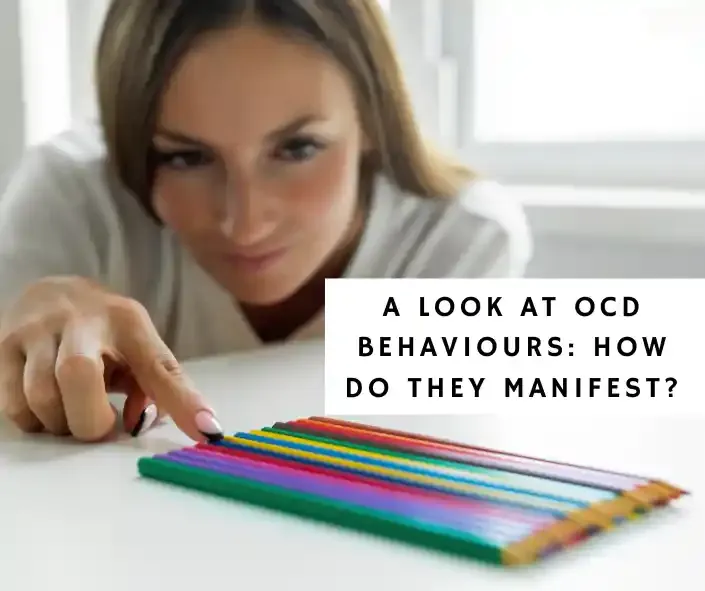

A look at OCD Behaviours: How do they Manifest?
Obsessive-compulsive disorder (OCD) sufferers are often portrayed as “germaphobes.” That they just can’t tolerate a messy space, or they always carry sanitiser with them.
While it’s true that many OCD sufferers have a dread of contamination and uncleanliness – not all present this way. In fact, there are four distinct kinds of obsessions that OCD sufferers experience, along with the compulsions that go along with them.
What can OCD look like?

Obsessions and compulsions are two related symptoms that OCD patients experience.
- Obsessions are unwanted and frequently repetitive ideas. They can be extremely unsettling.
People with OCD create compulsions to lessen the anxiety brought on by the thoughts as a coping mechanism. Obsessions followed by compulsions are the pattern that characterises OCD.
- Compulsions can manifest as external, repeated behaviours like checking, tapping, and washing one’s hands. However, they can also be internal habits, such as counting and phrase repetition.
Four Main Types of OCD Behaviour
Obsessions and compulsions can vary. However, the majority of them fall into one of the four groups listed below. More than one type of obsessive behaviours and thoughts are possible. Additionally, you might experience obsessions and compulsions that are not mentioned below.
1. Washing and Contamination
Obsessive thoughts about getting ill and spreading germs torment those with this form of OCD. Their obsession with cleaning goes far beyond the norm for hygiene practices and housekeeping.
For instance, a person with contamination OCD might:
- Create rituals that include repeatedly washing their hands to the point where they bleed.
- Utilise excessive amounts of bleach and other cleaning supplies to keep their surroundings free of contaminants.
- Avoid using public toilets or touching common items like doorknobs.
In addition to dirt and germs, those with contamination OCD might also become afraid of:
- Blood
- Bodily fluids
- Spoilt foods
- Broken glass
2. Double Checking and Doubt
OCD sufferers often don’t trust in their own judgement and memory. Every form of OCD has the central component of doubt. However, some individuals have a hard time questioning their perception of reality. They might also question their recollection of the recent occurrences.
When someone with this form of OCD leaves the house, locks the door, and then gets in the car, they might start to doubt whether they really did lock the door. Many individuals might have had similar experiences before. However, someone with OCD might need to check back several times before they feel confident that the job has been finished.
Another characteristic of OCD is incompleteness or the perception that something is not “just right.” For instance, a person with OCD might repeatedly lock their doors. Even if the door was closed securely the first time, this incompleteness can cause them to repeat the action until it feels “just right”.
3. Organising and Ordering
This form of OCD can cause a person to become fixated on the symmetry and order in their surroundings. The repetitive arrangement of the same objects until they reach a certain standard can take hours out of a person’s day who suffers from this type of OCD.
This group of compulsions includes, for example:
- Rearranging furniture until it feels “right.”
- Changing things around a set number of times (for example, putting the same book on a shelf nine times because that number holds special significance)
- Counting things over and over
4. Taboo/unacceptable Thoughts
People who suffer from this kind of OCD have intrusive thoughts, whether they be sexual, aggressive, or taboo in nature. Everybody occasionally experiences prohibited or “unacceptable” thoughts. However, those who have OCD might find it more difficult to let these ideas go.
“Taboo” thoughts frequently revolve around a few key topics, like:
OCD related to sexual orientation: An individual experiences intrusive thoughts or obsessions related to their sexual orientation. They might continually doubt their attraction to other individuals on a sexual level. Additionally, they might repeatedly seek out methods to validate their sexual orientation by seeking validation from other people.
Relationship OCD: Having the odd doubt in a relationship is normal. However, relationship OCD goes beyond these common worries. It might cause someone to recurrently wonder if they’re dating the “right” individual. Or they might become fixated on the “flaws” and characteristics of their companion.
Harm OCD: A person may worry about their will or capability to harm others. This fear may extend to hurting people they love, themselves or strangers. Harm OCD can also involve unwanted aggressive images or thoughts.
What is the most common type of OCD?
Contamination and germ OCD is the most prevalent form of OCD.
This form of OCD affects up to 46% of individuals with an OCD diagnosis.
What if I think I have OCD?
Whatever way your OCD manifests, the good news is that there are treatments available. The best starting point is to get professional help. Speak with your doctor or book an appointment with one of our experienced psychologists at Positive Mind works. We can help you with strategies and coping techniques that will allow you to quash your OCD worries and get your life back on track.
To book, click here or call our friendly reception team on 1800 327 477 (AU) / 0800 327 477 (NZ).

